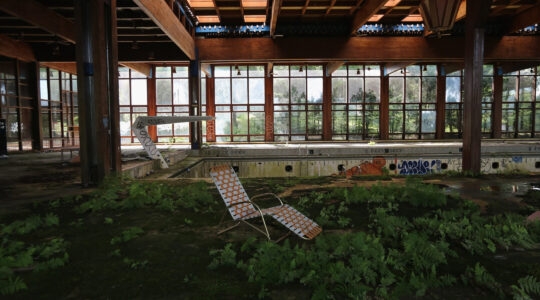First it was the 92nd Street Y, now it’s the Golders Green Chabad: Jewish institutions heaping honors on known sex abusers, retreating only under public pressure. What in the world were they thinking?
In the Golders Green neighborhood of London, the local Lubavitch-Chabad leadership held a large public celebration over the completion of a Torah scroll sponsored by a convicted sexual abuser, followed by an additional celebration, with the participation of Chabad leaders, at the abuser’s home.
It’s not as if the local Chabad leaders didn’t know who he was. The episode was one of the most talked-about scandals in the British Jewish community in the past decade. Yehudis Goldslobel revealed in 2011 that from the ages of 13 to 16, she was repeatedly sexually assaulted by a family friend, Menachem “Mendy” Levy (he was 27 at the time). According to Yehudis, after she reported the abuse, her family was ostracized from their local Lubavitch community.
After Levy was convicted, a prominent Lubavitch-Chabad rabbi, Rabbi Chaim Rapoport, appeared as a character witness at his sentencing, hailing the abuser as “the embodiment of repentance.” Rabbi Rapoport was asked what it was that Levy was repenting for, since Levy never admitted any wrongdoing. Rabbi Rapoport replied, in part, by claiming that in Jewish law, “the age of 15, 16, 16 and a half would be seen as somewhat arbitrary” —seeming to imply—outrageously—that Yehudis may have been a consenting adult, and suggesting the odious possibility of enlisting Jewish law in defense of sexual abuse.
Rabbi Rapoport and at least six other prominent local Lubavitch-Chabad rabbis participated in the celebrations last week when Levy, recently released from prison, offered to loan a newly-completed Sefer Torah to the local Lubavitch-Chabad synagogue, Hechal Menachem. According to a Chabad press release, after the festivities at the shul, the celebrants headed over to the sex abuser’s home, where “Rabbi Yossi Simon presented Mr. Levy with a thank you from Chabad of Golders Green.”
It was only after a public outcry that Rabbi Simon and his colleagues belatedly acknowledged they had made a mistake. But according to Rabbi Simon’s statement, the mistake was not in accepting the Sefer Torah, or in honoring the donor, but merely that this had become “a public event” which came “to be perceived as a celebration of this individual.”
That sounds to us like, “We got caught, and now that the public knows, we’re embarrassed, but we really didn’t do anything wrong except getting caught.”
Meanwhile, in Manhattan, the 92nd Street Y, one of the most prestigious Jewish venues in the U.S., honored the Israeli author Ari Shavit, an admitted sexual harasser, by inviting him to deliver the keynote address at its upcoming Israel Independence Day celebration. A few days later, Shavit’s name was withdrawn without explanation from the Y’s website after two additional women came forward to describe his sexual harassment of them.
So why choose to honor individuals who have committed untoward acts?There is no shortage of Sifrei Torah at Chabad Golders Green. And there is no shortage of spokeswomen, or men, who could represent Israel at the 92nd Street Y.
We don’t have the answer to that. But we know it’s wrong. Such honors send a message to the Jewish community that all has been forgiven, or never happened, or was inconsequential. That is a wrong and dangerous message to send to sex offenders, to victims, and to the community as a whole.
We are not saying that there is no way for an offender ever to be rehabilitated and re-enter the Jewish community. That can be determined only on a case by case basis. But surely, at a minimum, the first step must be a complete confession of the offenses committed against all their victims, and a genuine, public apology, with no excuses. And there must be payment of restitution to the victims.
Danielle Berrin, the Los Angeles Jewish journalist who was the first of Ari Shavit’s victims to reveal his actions, has suggested that Shavit should donate a percentage of his book sales to a charity that helps victims of sexual abuse. That doesn’t go far enough. We think all, not just a portion, of the proceeds from his books should be used to compensate his victims for the anguish caused them and for any medical expenses that ensued. Likewise, Menachem “Mendy” Levy should sell that Sefer Torah and give the proceeds to Yehudis Goldslobel and other women or children whom he or other abusers in the community harmed.
Enablers must suffer consequences, too. The 92nd Street Y staffers who invited Shavit, and the rabbis who knowingly participated in the public celebrations with Menachem Levy, must be called to account. What they did went beyond a mere error in judgment. It was a moral disgrace. And in London, what message did accepting Levy, indeed embracing him, send to Yehudis Goldslobel and to other victims of sexual abuse in the community, female and male?
Jewish institutions have no power to compel Ari Shavit or Menachem Levy to do the right thing. But the organized Jewish community can send a powerful message to the community by ostracizing unrepentant sex offenders. They should not be welcome in our synagogues or invited to speak from our platforms or allowed to be any part of Jewish public life.
Rafael Medoff and Shulamit Magnus are Jewish historians and commentators on Jewish affairs, and members of the steering committee of the Committee on Ethics in Jewish Leadership (www.jewishleadershipethics.org)
The New York Jewish Week brings you the stories behind the headlines, keeping you connected to Jewish life in New York. Help sustain the reporting you trust by donating today.




